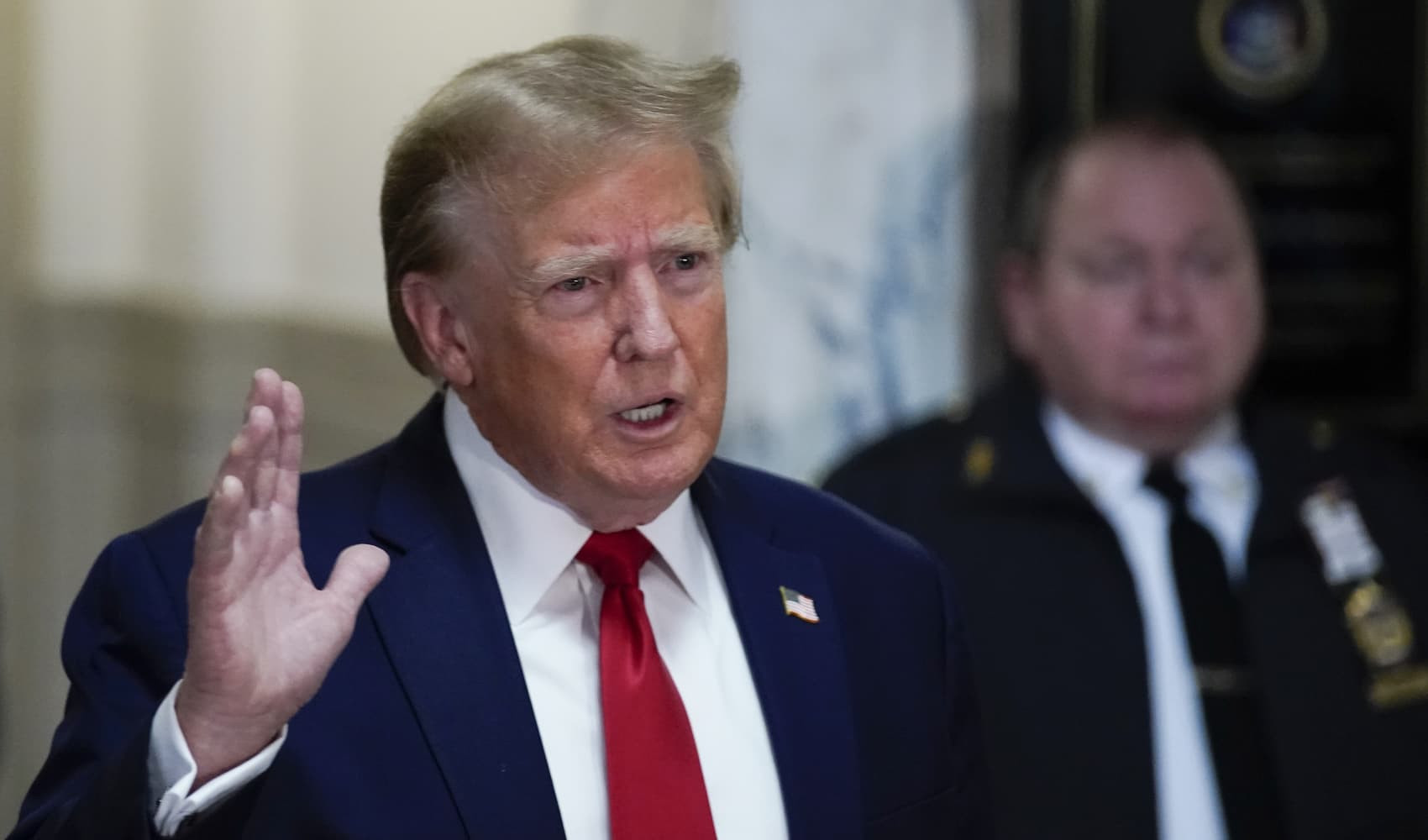A prominent New York real estate attorney, Adam Leitman Bailey, is under scrutiny after claiming he offered unsolicited legal advice to Judge Arthur Engoron, who presided over Donald Trump’s high-profile civil fraud case. This revelation has ignited a debate about judicial ethics and potential impropriety, particularly given Bailey’s past disciplinary history.
Bailey, a lawyer known for his assertive style and media presence, asserted in an interview with NBC New York that he approached Judge Engoron approximately three weeks before the judge issued his February decision. This decision saw the former president fined a staggering $454 million for inflating asset values. Bailey stated he sought to share his perspective on a specific law pertinent to the case, expressing a desire for the judge to “get it right.”
However, Judge Engoron, through a court spokesperson, has firmly denied any improper influence. The spokesperson stated that the judge’s decision was “wholly uninfluenced” by Bailey. Despite this denial, the New York State judicial oversight body has reportedly launched an investigation into the alleged interaction, adding a layer of seriousness to the claims made by Adam Bailey Lawyer.

Alt text: Donald Trump at a press conference, relevant to the context of the civil fraud case involving his organization.
Bailey’s Account of the Interaction and the Judge’s Response
In his on-camera interview with NBC New York, conducted on February 16th, the very day Judge Engoron’s ruling was expected, Adam Bailey lawyer described the encounter. He recounted seeing Judge Engoron at the courthouse and feeling compelled to approach him. “I saw him in the corner [at the courthouse] and I told my client, ‘I need to go.’ And I walked over and we started talking,” Bailey explained. “I wanted him to know what I think and why…I really want him to get it right.”
NBC New York directly questioned Judge Engoron’s spokesperson about whether any communication occurred between the judge and Bailey regarding legal matters related to the Trump civil fraud case and if such an interaction would be considered appropriate.
Al Baker, spokesperson for the New York State’s Office of Court Administration, issued a written statement refuting Bailey’s claims. “No ex parte conversation concerning this matter occurred between Justice Engoron and Mr. Bailey or any other person,” Baker stated. “The decision Justice Engoron issued February 16 was his alone, was deeply considered, and was wholly uninfluenced by this individual.”
The term “ex parte,” crucial in legal discussions, refers to a communication between a judge and a party or their counsel about a pending case when not all parties are present. Such communications are generally prohibited to ensure fairness and impartiality in the judicial process.
Adam Bailey lawyer clarified that he was not involved in the Trump civil case and has no connection to the former president’s separate criminal cases. He mentioned his familiarity with Judge Engoron, stating he had appeared before him “hundreds of times” in previous cases.

Alt text: News report image depicting Trump’s Fraud Lawsuit, visually representing the legal context of Adam Bailey’s alleged conversation.
Focus on the Legal Argument and Questions of Impropriety
Bailey stated he “explained to him” that the fraud statute central to the Trump case was not designed to dismantle a major corporation, especially in the absence of identifiable victims. He argued that such a ruling would negatively impact New York’s economic landscape, echoing arguments previously presented by Trump’s legal team in court, which Judge Engoron had rejected.
“He had a lot of questions, you know, about certain cases. We went over it,” Bailey added, suggesting a more in-depth legal discussion than acknowledged by the court’s official denial. However, when questioned specifically about whether Judge Engoron had engaged with Bailey or posed questions, the court spokesperson declined to comment further.
Legal expert Michael Bachner provided insights on the verdict in Trump’s civil fraud case, highlighting the complexities and potential ramifications of the judgment, which further emphasizes the sensitivity surrounding any external communication with the judge.
Scrutiny from Legal Ethics Experts and the Judicial Conduct Commission
Rules of legal conduct strictly govern interactions between judges and lawyers concerning pending cases outside formal courtroom proceedings. New York State’s Rules of Judicial Conduct explicitly forbid judges from initiating, permitting, or considering ex parte communications. While an exception exists for judges to consult “disinterested experts,” this requires notification to all parties involved in the case, allowing them an opportunity to respond – a procedure seemingly not followed in this instance, based on current information.
The New York State Commission on Judicial Conduct is now evaluating whether these rules were breached, according to sources familiar with the matter. Robert Tembeckjian, the commission’s administrator, refrained from commenting directly, citing confidentiality statutes.
Christopher Kise, a member of Trump’s defense team, which has been critical of Judge Engoron’s handling of the case, asserted that if Bailey’s assertions are truthful, it would raise significant doubts about the impartiality of the judicial process. “The code doesn’t provide an exception for ‘well, this was a small conversation’ or ‘well, it didn’t really impact me’ or ‘well, this wasn’t something that I, the judge, found significant,” Kise stated, emphasizing the strictness of ethical guidelines. “No. The code is very clear.”
Alt text: Donald Trump exiting a courtroom, visually linking him to the ongoing legal proceedings and the controversy surrounding Adam Bailey lawyer.
Several legal ethics experts consulted by NBC New York emphasized that these rules are designed not only to prevent actual undue influence but also to avoid any appearance of impropriety. Retired Presiding New York Appellate Justice Alan Scheinkman noted that if Bailey’s account holds true, disclosing the interaction to all parties involved would have been a prudent step for Judge Engoron, particularly in a case of such magnitude. “If there’s any substantive dialogue about the law in a pending case, it should be disclosed,” Scheinkman stated.
Adam Bailey Lawyer Defends His Actions Amidst Growing Scrutiny
In a subsequent interview with NBC New York, Adam Bailey lawyer stood firm by his initial account, maintaining that neither he nor the judge acted improperly. He reiterated that their discussion centered solely on legal principles, stating, “We didn’t even mention the word Donald Trump.” When questioned about whether Judge Engoron would have understood the conversation’s relevance to the Trump case, Bailey responded, “Well, obviously we weren’t talking about the Mets,” implying the context was unmistakably clear.
However, Alan Scheinkman, now a legal ethics professor at Pace University Law School, described the interaction as “very troubling.” “The fact that this lawyer made these statements — unprompted — during a recorded TV interview should raise serious concerns,” Scheinkman added, highlighting the unusual nature of Bailey’s public disclosure.
Professor Bruce Green, director of Fordham Law School’s Center for Law and Ethics, offered a nuanced perspective, noting that judges and lawyers can engage in abstract legal discussions. “Judges don’t have to live in a bubble,” Green stated. “Whether a judge’s hallway conversation with a lawyer is permissible or impermissible depends on the conversation.” This emphasizes the need for the investigation to determine the specific content and nature of the exchange between Adam Bailey lawyer and Judge Engoron.
A spokesperson for Attorney General Letitia James, who initiated and won the civil case against Trump, declined to comment on Bailey’s claims, further underscoring the sensitivity of the ongoing situation.
Adam Bailey’s Background and History of Controversy
Adam Bailey lawyer has been a visible figure in the New York legal scene for many years, including his two-decade tenure as an expert in The New York Times’ “Ask Real Estate” column. Notably, in 2011, he initiated a lawsuit against the Trump Soho condominium, alleging misleading practices towards buyers. This case was settled, with Bailey’s clients recovering a significant portion of their funds, and without admission of wrongdoing from Trump.
However, Bailey’s career also includes disciplinary action. In 2019, a New York appellate court suspended Adam Bailey lawyer’s law license for four months due to professional misconduct in two separate incidents. These incidents involved improperly photographing witnesses during an arbitration hearing and making inappropriate remarks to a tenant in a separate case, as detailed in court records.
New York’s Rules of Professional Conduct explicitly prohibit lawyers from implying an ability to exert improper influence over a judge, a rule that gains renewed relevance in light of Bailey’s recent claims.
Since February, both Bailey and Judge Engoron’s spokesperson have ceased responding to further inquiries from NBC New York, leaving a gap in information regarding the specifics of their interaction. This silence only amplifies the ambiguity and fuels the ongoing investigation.
The Commission on Judicial Conduct’s investigation into these allegations is ongoing and confidential. Historically, the commission investigates a fraction of the complaints it receives, with a smaller portion resulting in findings of wrongdoing. The consequences for judges found in violation range from private cautions to removal from the bench, highlighting the potential seriousness of the current inquiry concerning Adam Bailey lawyer and Judge Engoron. These investigations can extend from several months to over a year, suggesting this matter may remain under scrutiny for some time.
This unfolding situation underscores the critical importance of judicial ethics and the need to maintain public trust in the impartiality of the legal system. The investigation into the alleged interaction between Adam Bailey lawyer and Judge Engoron will be closely watched as it progresses.


